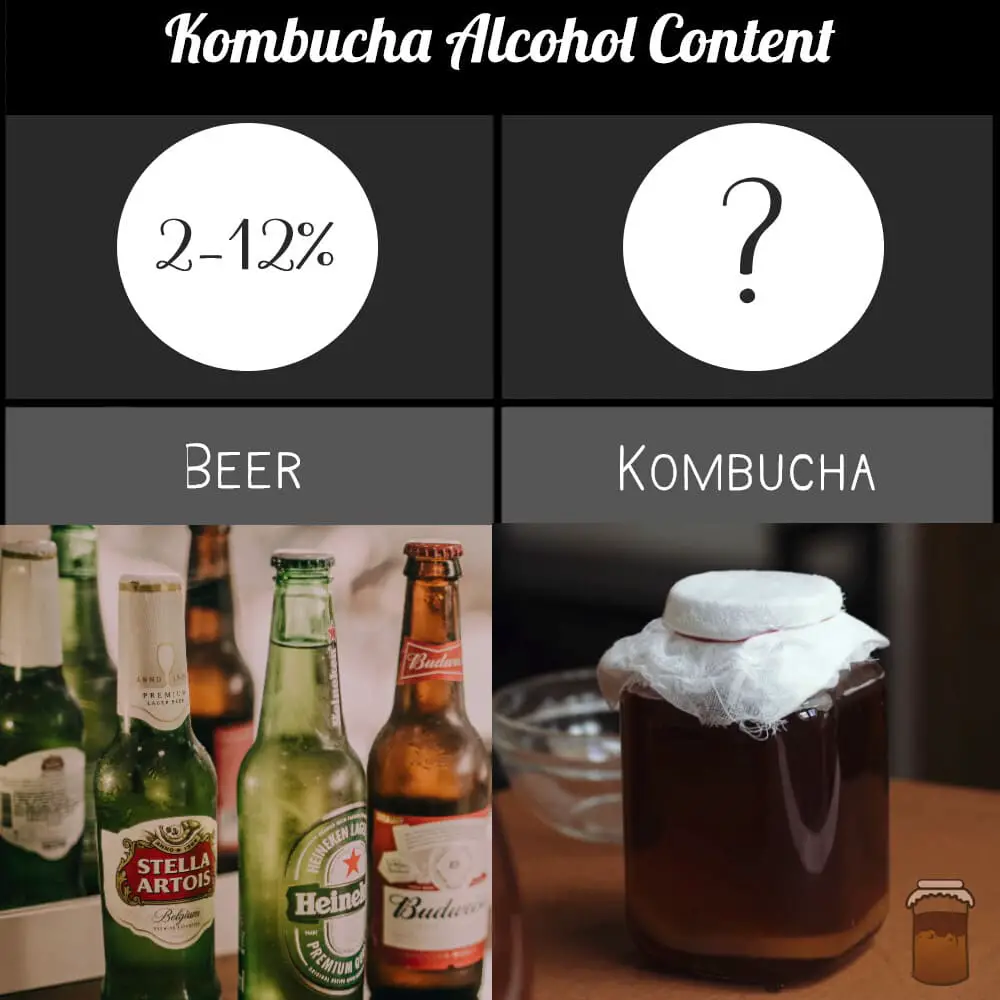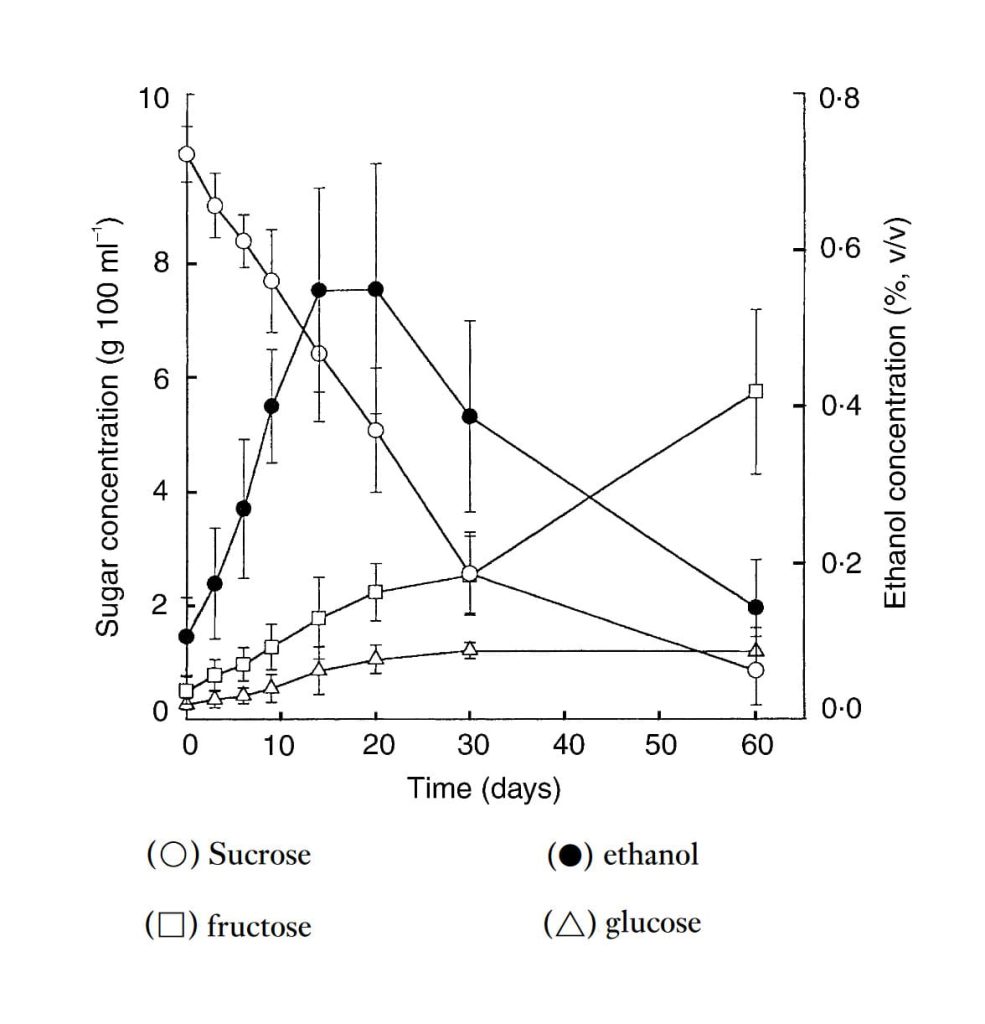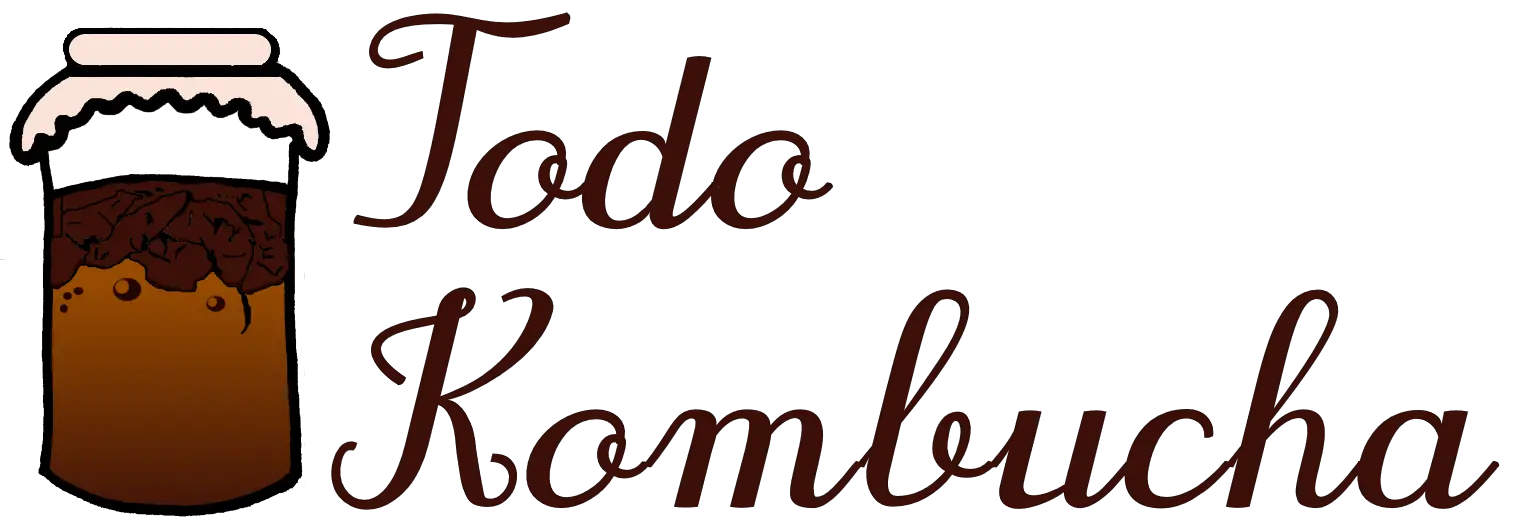
Surely you already know kombucha and are at that stage where you would like to learn more and more about this fermented drink. One of those questions is, does kombucha have alcohol?
In short, kombucha has a slight alcohol content product of the fermentation of yeasts. On average, kombucha has 0.5% alcohol, considered a non-alcoholic beverage. However, there are certain varieties with up to 4.0% alcohol.
The way alcohol content changes over time is quite interesting, so if you’re just getting started with kombucha, I invite you to keep reading.
How is alcohol produced in kombucha?
Kombucha has a colony of yeasts and bacteria that live in symbiosis; in other words, they benefit each other. This colony is known as SCOBY and commonly becomes visible as a cellulose layer forming on the surface.
If you have seen or read about beer production, it will be familiar to you that they also use yeasts, which produce alcohol.
In kombucha, the same thing happens. The yeasts present in kombucha feed on sugar (sucrose) and then convert it into ethanol, fructose, and glucose mainly.
Ethanol is responsible for giving alcohol content, and it will be produced whenever there is a sucrose substrate in the kombucha.
Alcohol variation in kombucha
As I mentioned in the introduction of this post, the alcohol content of kombucha can vary due to 2 factors:
- Fermentation time
- Addition of alcoholic substrates in the second fermentation.
We will analyze these cases separately.
How alcohol content varies with fermentation
You already know that to produce the alcohol in kombucha, you require the joint action of sugar and yeast, so the interesting question is, how is more alcohol going to be created if I don’t add more sugar?
The answer is intuitive; you will not produce more alcohol if you do not add more sugar. So the alcohol content is produced until you consume all the sugar you have and then stays constant? Nope.
It turns out that, as I mentioned earlier, kombucha also contains bacteria, and these have to be in symbiosis with yeasts, and one of the ways they benefit from yeasts is with the consumption of ethanol; that is, the bacteria feed on alcohol and transform them into organic acids. [1]
In conclusion, the longer the kombucha is fermented, the lower its alcohol content, as seen in the following graph.

We see that the alcohol content in kombucha increases rapidly until it reaches a maximum on day 20, then decreases more slowly than it rises.
How to modify the alcohol content in the second fermentation
There is an option for those who want to taste kombucha with a higher alcohol content than usual. It is for this reason that there are varieties that are known as hard kombuchas.
This type of kombucha is nothing more than the normal variation of kombucha in a second fermentation process, where dehydrated champagne yeasts are usually added. The second fermentation is re-fermenting a ready-made kombucha.
To get an idea, it’s like mixing orange juice with vodka to make orange vodka.
How much alcohol does kombucha have?
The alcohol content of kombucha varies with fermentation time, as we have mentioned, and adding specific yeast to make it more alcoholic in some varieties. Still, on average, it has a percentage of 0.5% alcohol.
This percentage is the maximum obtained during fermentation, and on average, kombucha has a fermentation time of 7 to 14 days, so if you look at the previous graph, you will understand that this fits perfectly.
The above is also complemented by the fact that the different brands want kombucha to remain classified as a non-alcoholic beverage compatible with drinking in places such as workplaces. However, in some tests, you can be positive for alcohol.
We have a fascinating article about drinking kombucha at work that may interest you, as we also have some about detecting kombucha in drug and alcohol tests.
Getting drunk on kombucha is it possible?
There are several factors to consider when a person consumes alcohol. It is not only the percentage of alcohol in the drink or how much he drinks that determines whether he gets drunk.
The first factor is your liver’s ability to cleanse your blood from the alcohol you consume.
There is also the factor of habit. It is not the same as an experienced drinker, whose organism has already developed resistance to specific doses of alcohol, as a novice.
Another factor is physical activity, and whether you have some food in your stomach or not, the food absorbs alcohol and makes it digest slower, which helps to avoid getting drunk or at least prevents that state from deepening too much.
We can’t be sure whether or not you can get drunk on kombucha. However, we can tell you that you would have to be especially sensitive to alcohol to get drunk.
To put it in context, you have to drink about eight bottles of kombucha to feel the same effects as a bottle of beer, so here you can determine if kombucha can get you drunk.
Is there an alcohol-free kombucha?
As with non-alcoholic beers, it is possible to find varieties of non-alcoholic kombucha on the market, although you cannot verify that they are really 0% alcohol.
The only way to get a kombucha that does not have alcohol is to lengthen its fermentation for a long time so that it has no substrate to produce more alcohol and that the bacteria have consumed the remaining ethanol.
But the truth is that there is no scientific evidence up to this point since, if it were something natural to achieve, kombucha would be composed entirely of organic acids, resulting in an incredibly acidic drink, probably impossible to drink.
Therefore, for fermentation at home, you can only reduce the levels of alcohol but never reach the extreme of being able to eliminate any alcohol residue.
Did you like the article? Let’s hope so. Please comment if you have any doubts, as we will also leave you these exciting posts.
References
